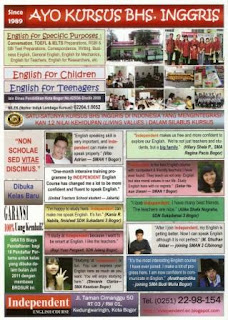American and British English are very similar. There are, however, a few differences of grammar, vocabulary and usage.
Any more
In British English, any more is usually written as two separate words. In American English, it is often written as one word anymore when it refers to time (= any longer). It usually comes in end position.
She doesn't work in New York anymore.
Around and about
In British English, around and about are both used to refer to movements or positions that are not very clear or definite: 'here and there', 'in lots of places', 'in different parts of', 'somewhere in' and similar ideas.
The children were running around/about everywhere. (GB)
'Where is John?' 'He must be somewhere around/about.' (GB)
In American English, about is not used with this meaning. Americans normally use around.
The children were running around everywhere. (US)
'Where is John?' 'He must be somewhere around.' (US)
Note that in American English, about is mostly used to mean 'approximately'.
There were about fifty people there.
Illnesses
The names of illnesses are usually uncountable in standard British English. The can be used informally before the names of some common illnesses such as the measles, the flu; others have no article.
The words for some minor ailments are countable: e.g. a cold, a sore throat, a headache. However, toothache, earache, stomach-ache and backache are more often uncountable in British English. In American English, these words are generally countable.
Love isn't as bad as toothache. (GB)
Love isn't as bad as a toothache. (US)
I have got backache. (GB)
I have got a backache. (US)
Place names
In British English, the is unusual in the titles of the principal public buildings and organisations of a town.
Oxford University (NOT the Oxford University)
Hull Station (NOT the Hull Station)
Salisbury Cathedral
Birmingham Airport
Bristol Zoo
Manchester City Council
In American English, the is more often used in such cases.
The San Diego Zoo
The Detroit City Council
Holiday and holidays
In British English, the plural holidays is often used for the 'big holiday' of the year. In other cases, British people normally use the singular holiday.
Where are you going for your summer holidays?
Next Monday is a public holiday.
Americans normally use the word vacation. In British English, vacation is mainly used for the periods when universities are not teaching. Holiday is used in American English for a day of publicly observed celebration whether or not people work on it.
Ill and sick
Ill is often used to mean 'unwell' in British English. In American English, ill is unusual except in a formal style. Ill is most common in predicative position.
Peter didn't come because he was ill.
In attributive position many British people prefer to use sick. Sick is also the normal informal American word for 'unwell'.
He spent years looking after his sick father.
He is sick.
Drown
In British English, both active and passive forms of drown can be used to talk about accidental drowning.
He (was) drowned while trying to swim across a river.
In American English, only active forms are used to talk about accidental drowning.
He drowned while trying to swim across a river.
Awake and awaken
The verbs awake and awaken are irregular in British English, but can be regular in American English.
Awake - awoke - awoken (GB/US)
Awake - awaked - awaked (US)
Awaken is regular in both British and American English.
Awaken - awakened - awakened (GB/US)
Bath and bathe
In British English, the verb bath is used to mean 'wash oneself in a bath tub'.
Children have to be made to bath regularly.
The verb bath is not normally used in American English. In an informal style, we usually say have a bath (GB) or take a bath (British and American).
I am feeling hot; I think I should take a bath. (US/GB)
I think I should have a bath. (GB)
Bathe
In British English, bathe can mean 'swim for pleasure'. In American English, bathe is commonly used to mean 'take a bath'.
It is your turn to bath the baby. (GB)
It is your turn to bathe the baby. (US)
I always bathe before I go to bed. (US)
Real
In informal American English, real is often used instead of really before adjectives and adverbs.
That was real nice.
She sings real well.
Sure
Sure is often used to mean certainly in an informal style. This is common in American English.
'Can I borrow your bicycle?' 'Sure.'
Slow
Slow is used as an adverb in road signs, and informally after go and some other verbs especially in American English.
Examples are: go slow, drive slow.








